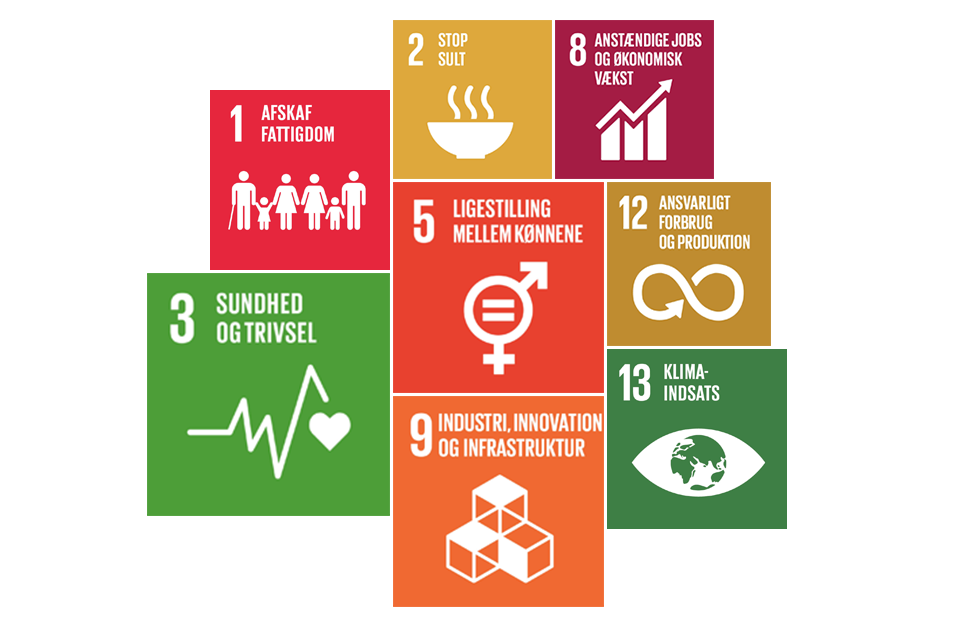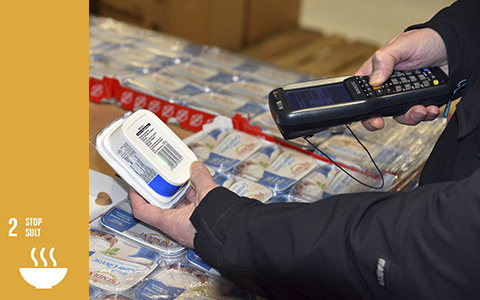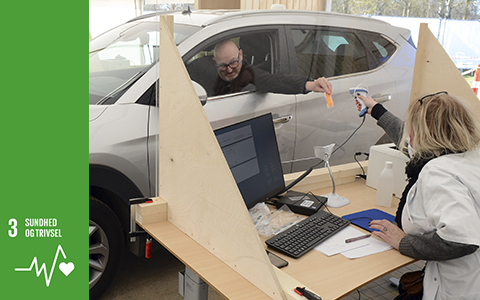Sådan arbejder vi med FN’s 17 verdensmål
FN’s 17 verdensmål er den hidtil mest ambitiøse globale udviklingsdagsorden med fokus på bæredygtighed og transformation. Verdensmålene blev vedtaget på FN-topmødet i New York den 25. september 2015. Her vedtog verdens stats- og regeringsledere 17 verdensmål samt 169 delmål for en bæredygtig udvikling, der skal hjælpe med at løse fremtidens klimaudfordringer.
Verdensmålene forpligter alle FN’s 193 medlemslande til at skabe en mere bæredygtig verden ved at afskaffe fattigdom og sult, reducere ulighed, sikre god uddannelse og bedre sundhed til alle, anstændige jobs og mere bæredygtig økonomisk vækst. Det er sandsynligvis vor tids vigtigste plan.
Sammen kan vi gøre en forskel
Der er ingen tvivl om, at hvis der skal skabes udvikling og konkrete resultater, kræver det en indsats fra alle. Mange virksomheder, ildsjæle og organisationer i Danmark er allerede i fuld gang med at sætte bæredygtige udviklingsspor med udgangspunkt i verdensmålene – det gør sig også gældende hos Delfi Technologies, men vi kan dog langt fra løfte verdensmålene alene.
Men når vi opstiller klare mål og prioriterer vores ressourcer derefter, er det muligt at opnå resultater. Det kræver indsats på det store plan fra regeringer, multinationale virksomheder og verdensomspændende NGO’er – men også på mikroplan med byråd, mindre virksomheder og frivillige ildsjæle.
Hos Delfi Technologies har vi valgt at fokusere på et udvalg af de 17 verdensmål, hvor vi mener, at vi kan gøre en særlig forskel. Vores indsats dækker i øjeblikket følgende verdensmål:


Mål 2: Stop sult
Case: FødevareBanken – fra madspild til måltid
Gennem vores samarbejde med FødevareBanken om udvikling af en stregkodeløsning til elektronisk produktregistrering, støtter vi FN’s globale mål, der sigter mod at udrydde fattigdom, stoppe sult, skabe mindre ulighed, sikre ansvarligt forbrug og produktion og gøre en indsats for klimaet. Det er en god løsning, fordi den binder al logistik sammen og hjælper med at sikre produktets sporbarhed. Projektet skiller sig ud ved at skabe et højt niveau af fødevaresikkerhed i forsyningskæden, hvilket bidrager til mindre madspild i Danmark.
Alene i 2019 blev der indsamlet og udleveret mere end 1.350 tons mad til socialt udsatte i Danmark. Det blev til mere end 3.375.000 måltider og har skabt en reduktion i CO2-udledningen på 1.806 tons. (Kilde: https://foedevarebanken.dk/).
Et samarbejde med en række fødevarevirksomheder sikrer donation af overskudsfødevarer, der bliver registreret elektronisk med en stregkodeløsning. Selve løsningen kan nemt skaleres til samarbejde med flere virksomheder – både nationalt i Danmark, men også i udlandet. Fødevarernes stregkoder er med til at sikre sporbarhed.
Med stregkodeløsningen kan FødevareBanken altid finde tilbage til nøjagtig, hvor et specifikt parti fødevarer er blevet indsamlet, samt hvor det pågældende parti er blevet udleveret. Det unikke ved løsningen er, at det er muligt at sikre varesporbarhed i hele processen og reagere hurtigt hvis der skulle opstå behov for at tilbagekalde et parti fødevarer. Samtidig arbejdes der efter et “First in First Out” princip, så de fødevarer med kortest holdbarhed bliver delt ud først, så risikoen for spild konstant minimeres. Løsningen er udviklet af Delfi Technologies i samarbejde med FødevareBanken.

Mål 3: Sundhed og trivsel
Case: Bedre patientsikkerhed i Danmark
Vi er innovative i vores arbejde med hardware- og softwareløsninger til sundhedssektoren. Gennem et samarbejde med de danske regioner, skaber vi stregkodeløsninger, der er med til at styrke patientsikkerheden og lette arbejdet på regionernes sygehuse.
Softwareløsningen, Delfi EasyScan, er udviklet af Delfi Technologies og består af stregkode software, håndscannere og armbåndsprintere. Det er en central stregkodeløsning, som giver nye teknologiske muligheder og samler forskellige arbejdsfunktioner i én løsning. Nye håndscannere skal blandt andet være med til at forkorte arbejdsprocesser og skabe bedre overblik.
I 2020 brød Coronavirus for alvor igennem. I den forbindelse blev der etableret en række testcentre rundt omkring i Danmark. Her bliver testpersonens sygesikringskort registreret ved hjælp af håndscannere, som Delfi Technologies blandt andet leverer til Region Sjælland og Region Hovedstaden.
Scannerne er en speciel antibakteriel model, som egner sig særligt til sundhedsvæsnet og kan modstå særlige vilkår som ekstra rengøring og desinficering.
Mål 5: Ligestilling mellem kønnene
– Selvom it- og tech-branchen historisk set har været meget mandsdomineret, så oplever vi en trend i Delfi Technologies, hvor der kommer flere kvinder til i dag – både internt i virksomheden og i netværket omkring os. I ethvert ansættelsesforhold sikrer vi naturligvis også ligestilling mellem kønnene, så mænd og kvinder har de samme rettigheder og muligheder, siger Caroline Hagen, der er CMO hos Delfi Technologies A/S.

Mål 8: Anstændige jobs og økonomisk vækst
– I vores arbejde med at sikre vores kunder den seneste teknologi, bidrager vi også med løsninger, der skaber en højere produktivitet. Vi ser i højere grad et ønske fra vores kunder om at foretage en teknologisk opgradering som virkemiddel til at skabe økonomisk vækst, fortæller Palle Svendsen, der er CEO hos Delfi Technologies A/S.
Mål 9: Industri, innovation og infrastruktur
– Hos Delfi Technologies lægger vi stor vægt på innovation og betragter det som en afgørende drivkraft for teknologisk udvikling. Vores vigtigste opgave er at være på forkant med udviklingen og skabe innovative løsninger, der fremmer vores kunders forretning og konkurrenceevne, siger Palle Svendsen.

Mål 12: Ansvarligt forbrug og produktion
Case: Digitalt værktøj hjælper MENY i kampen mod madspild
Et centralt element i FN’s 17 verdensmål er bekæmpelsen af madspild. Delmål 12.3 lyder på, at inden 2030 skal det globale madspild på detailog forbrugerniveau pr. indbygger halveres og fødevaretab i produktionsog forsyningskæder skal reduceres.
I dag er madspild et prioriteret indsatsområde hos mange supermarkedskæder. Sammen med Dagrofas flagskibskæde, MENY, anvender vi et digitalt værktøj til at fjerne risikoen for, at der overhovedet genereres madspild. Hos MENY handler det ikke blot om, at man får givet overskudsmad væk til sociale formål, men i højere grad også om, at man får ændret rutinerne hos butikspersonalet.
Whywaste hedder det nye værktøj, der har fundet vej til landets MENY-butikker, som et seriøst initiativ i kampen mod madspild og datovarer. Som en del af Whywaste-projektet er Delfi Technologies valgt som it-leverandør af håndterminaler og mobile labelprintere til Dagrofa.
Mål 13: Klimaindsats
Case: Jensen Seeds – øget sporbarhed i forsyningskæden
Gennem vores samarbejde med Jensen Seeds, sikrer vi en positiv indflydelse på verdensmål 12 og 13.
Det danske frøfirma Jensen Seeds leverer årligt mere end 10.000 tons frø til sine kunder. Derfor er det altafgørende, at der ikke sker fejl i produktionen og sorteringen af frøene. Her opstod behovet for en RFID-løsning til at spore, lokalisere og identificere processen fra avler til fuldautomatisk rensning, sortering og pakning.
En vedvarende investering i innovation og infrastruktur er nemlig en afgørende drivkræft for økonomisk vækst og udvikling. Her er den teknologiske udvikling nøglen til at finde løsninger på både økonomiske og miljømæssige udfordringer.
I arbejdet med kvalitetssikring er Jensen Seeds den første frøleverandør i verden, der i sin tid tog den trådløse RFID-teknologi i brug. I dag er Jensen Seeds ejet af DLF, som er en global frøvirksomhed, der afsætter frø til fodergræs, samt privat og professionelt plænegræs, i mere end 80 lande verdenen over. Også her er Jensen Seeds first mover, og mange andre producenter kigger derfor denne vej når det kommer til inspiration til procesoptimering, bedre kontrol og øget sporbarhed.

